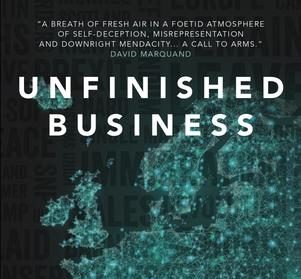Adam Somerset re-reads a book reviewed in Wales Arts Review in 2018, Geraint Talfan Davies’ essays on Europe, Unfinished Business, and finds a powerful portentous book in light of current global affairs, and the unfolding of the Brexit debacle.
“You cannot step into the same river twice, for other waters are continually flowing on.” It is the most renowned saying of Heraclitus of Ephesus from the fifth century BCE. As with Heraclitean rivers, so it is with books. The same book is never read twice.
Geraint Talfan Davies could not have guessed the degree of prescience in the title he chose. Unfinished Business is a stronger book in 2019 than it was when it was published. In 2018 it was topical. A year on, and given a re-reading, it has acquired the patina of history. Its accumulation of separate pieces is now greater than articles penned in reaction to immediate events.
The preface for Unfinished Business was written in 2005. The remaining 42 pieces follow a time-span from January 2011 to March 2018. The result passes the test of significance on three counts.
The first is the author himself. His standpoint is unambiguous. His father ‘s Swansea pharmacy was destroyed in war. He is of age enough to have memory of the invasion of Suez and the Hungarian Uprising. He wrote pro-Europe pamphlets for the late Gwyn Morgan. Morgan went to the Commission “to establish powerful regional policies” Presence in Brussels is obvious; it is access to power.
The author, and his articles, are grounded in knowledge and history. The history can be recent. Cameron, the name unmentioned in 2019, is chided in 2011: “the Prime Minister has both abandoned potential mainstream allies in European centre-right parties, and preferred to lecture the eurozone from a distance.” A few pages on: “We can debate whether a Yes vote would require David Cameron’s resignation.” A Johnson premiership threatens. It sounds the wrong way about. In fact Talfan Davies is writing in 2014, the summer of Scotland’s referendum. It is a reminder that turbulence has been going on for years.
He looks further back for historical comparison. UKIP, he says, resembles the Know-Nothings in nineteenth century USA. They were nativists, hostile to immigration. In their case it was “the Pope in the nineteenth century as the source of all evil in the same way as the European Commission is lampooned today.” The author recalls the UKIP campaign poster that read: “26 million people in Europe are looking for work. And whose jobs are they after?”
He reads a historian with a Welsh connection. Norman Davies is cited from his book Vanished Kingdoms on “the often bewildered European states of the twenty-first century…in short, in denial; and as people in denial often do, they become tense, rigid, deceitful, and irrationally defensive.”
It is not in Unfinished Business but Norman Davies takes a long view on the United Kingdom itself. Its disintegration began in 1922 and will probably continue for a simple reason. The English ‘are less aware of complex identities than are the Welsh, the Scots or the Irish. Hence, if the end does come it will come as a surprise.’ It is true. The thousands who marched in Merthyr on 7th September went unnoticed by England.
The book’s second virtue is structural. Unfinished Business opens at a time of referendum. The year is not 2016 but earlier. A condition for the coalition in Westminster was a popular vote on changing the voting system. The change from first-past-the-post was trounced, 68% against on a low 42% turn-out. The consequences for a five party structure in England are profound. Arithmetically it is feasible to gain a majority in the Commons on a 13% share of the vote.
The third virtue is that it is a record, and the only one, of the view from Wales. Mark Drakeford is here as Finance Minister in November 2016. He lists ten priorities at a conference in Swansea. “Full and unfettered access to the single market” is the,first.
As for the numbers it is not just about beef and lamb being protected, The European Investment Bank has invested £1.6bn in Welsh projects in the last twenty years. The article “Single Market of the Mind” of March 2017 looks at the importance of Europe for intellectual life. £117m came into Welsh universities from the EU during 2007-13. 16% of academic staff across the UK are European. In Swansea University Europeans hold 27 professorships.
If a best were needed it would be “Europe means us” from July 2015. The author demolishes the central myths, separateness, influence, burden in turn. Hilary Benn informed an audience in 2016 that the United Kingdom is signatory to 14,000 international agreements. Talfan Davies has mingled with power over a lifetime. “Untrammelled sovereignty,” he writes, “is a myth- shared power is real power.”
Adam Somerset’s collection of essays Between the Boundaries is available now from Parthian.











